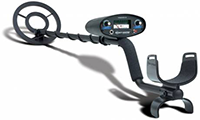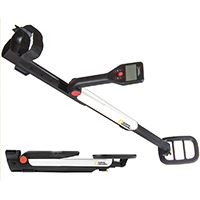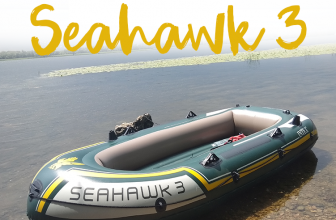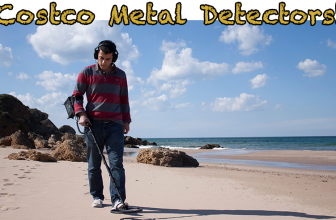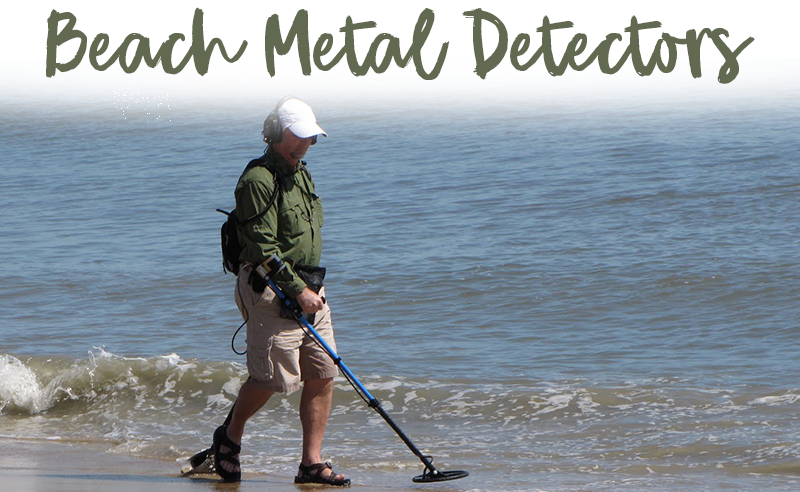
Many people who are new to metal detectors don’t realize that there are specific metal detectors that are better for the beach than others.
This is because there are many metal detectors that don’t work well with saltwater and its high mineral content.
More...
To help you out, we’ve picked out some of the best metal detectors that are meant to work well on the beach!
Let’s dive into it, shall we?
Best Beach Metal Detectors
- Submersible Search Coil for Water Searching!
- Five Separate Search Modes
- 2.7lbs in Weight
- Great Beginner Metal Detector For Deep Searching!
- Three Separate Search Modes
- 4.2lbs in Weight
- Best Metal Detector For Kids!
- Three Separate Search Modes
- 2.3lbs in Weight
The Top 8
#1 Best Overall Beach Metal Detector: Garrett ACE 250 Metal Detector
The Garrett ACE 250 is easily one of the most popular metal detectors on the market, as it is perfect for beginners and veterans alike.
It’s an incredibly reliable metal detector that has a variety of coils for finding different types of treasure. The thing that attracts so many people to it is that it’s incredibly user-friendly.
Switch the thing on and you’re ready to treasure hunt. In all, there are five different detection modes including All Metal, Coins, Relic, Jewelry, and more. Thanks to the lightweight design, you can pretty much take this metal detector with you anywhere. When in use, you can make use of the carrying bar for comfortable searching.
Unlike many other cheaper metal detectors that try to compete with the Garrett ACE 250, this one comes with electronic pinpoint. It helps to make recovering targets that much easier. You can even adjust the sensitivity control to work with eight different levels of sensitivity. Beyond all that, the coils can be submerged underwater, giving you the ability to find treasure that is just offshore.
Pro's
Con's
#2 Best Overall Beach Metal Detector: Bounty Hunter TK4 Tracker
If you’re looking to go a bit more extreme with your metal detecting, may we recommend the Bounty Hunter TK4 Tracker.
It’s a bit less expensive than the Garrett ACE 250, though still works really well in serious conditions. There are three different modes built in to the metal detector including two-tone, all-metal, and discrimination mode. You can easily detect larger objects up to a couple feet long as well. One of the things that makes it so great for the beach is the preset ground balance. This helps to neutralize mineral response.
Another cool thing is that the disc/notch control helps the metal detector to distinguish between targets that you are searching for and trash.
There is nothing worse than digging for what you think is going to be a come-up, only to realize that it’s some old, rusty can. The interface is pretty straightforward, making it a great introductory metal detector. Just like the Garrett ACE 250, you can put the coils in the water for some deeper searching.
Pro's
Con's
#3 Best Overall Beach Metal Detector: National Geographic ProSeries
If you’re looking for a metal detector that your little ones can use as well, we recommend going with the National Geographic Pro Series metal detector.
It’s incredibly easy to use for all different ages and skill levels. The 10” coil makes is just big enough for creating a mid-sized detection area while the 2lb build makes it super easy to carry around. There are three separate detection modes, as well as four sensitivity levels to help you discover treasure in different places.
Unlike many other metal detectors in this price range, the National Geographic Series has a pinpoint feature, helping you to distinguish trash from treasure.
The best part about this metal detector is that it folds up into an ultra-portable size, making it very easy to travel with. The coil is waterproof too, allowing you to search for treasure in less assuming places. While this may seem like a lot to take in, you’ll be happy to know that all the features and characteristics are shown on the bright, LCD display that is very user-friendly.
Pro's
Con's
#4 Bounty Hunter Gold Digger Metal Detector
The Bounty Hunter Gold Digger is an excellent metal detector for any hunter who is on a budget! From a variety of valuable metals to different gold coins and iron, this metal detector can pretty much do it all. Even with how inexpensive it is, you can easily find coins that are up to six inches deep in the ground.
For items that are large, the metal detector has been known to search up to two feet deep. If you’re looking to search more inconspicuously, you’ll love the included headphones.
One of the other great things about this metal detector is that there is a trash eliminator that is built onboard, helping you to ignore the undesirable pieces of metal that may be hiding underground.
You can also adjust the sensitivity control if you feel like the metal detector is picking up more than you asked for. The user-friendly design, as well as the comfortable and lightweight build, make it excellent for beginner treasure hunters!
Pro's
Con's
#5 RM RicoMax High-Accuracy Metal Detector
If you’re looking for a metal detector with more of a high-tech, futuristic look, the RM RicoMax might be right up your alley. You’ll dig the large, 10” search coil, which gives you a large surface area to search on.
You can also submerge the coil in shallow water thanks to the waterproof design, making it an excellent choice for the beach or other wetland areas. There are a few different modes available on the metal detector including True Discrimination Mode, which only detects iron, aluminum, gold, and other precious metals.
Techies will dig the LCD display that provides all of the detectors information including the detection mode, battery and sensitivity level, and beep volume.
There is even a small arrow that gives you the type of metal that you’ve just found to help make your search a bit more efficient. It’s seriously convenient. Beyond the display, you can also listen to the variety of tones to hear what kind of metal you’ve just found.
Pro's
Con's
#6 Bounty Hunter Discovery 3300 Metal Detector
The Bounty Hunter Discovery 3300 is one of the higher end metal detectors in the Bounty Hunter line with its manual ground balance that gives you serious performance in the craziest of conditions.
This makes it excellent for rocky beaches or shallow tide pools, as it neutralizes the response to high mineral content present in the terrain. The detector can search incredibly deep too, allowing you to find specific targets at chosen depths. Serious searches can find objects up to four feet deep in the ground!
There are a few modes built into the device including All-Metal, Discrimination, Notch, and Pinpoint, depending on the type of searching that you want to do.
Veteran searchers love the 11-segment portable target ID that helps to tell you what type of target you’ve found. It’s also a simple display that only gives you the info without any of the fuss. All of this and the Discovery 3300 is still pretty lightweight at only 2.5lbs with an eight-inch search coil.
Pro's
Con's
#7 Teknetics Delta 4000 Metal Detector
The Teknetics Delta 4000 is a higher-end, yet user-friendly metal detector that is perfect for hunting gold, coins, and other types of relics.
One of the main features of this bad boy is the large LCD display, which is incredibly easy to read, as well as an effective 2-digit numerical ID system for identifying and separating different targets. Thanks to the included depth indicator, you can find small targets up to eight inches deep.
There are a few different modes as well, including All Metals and Discrimination. You can use the three different audio tones to help differentiate the metal types.
One of the most surprising things about this metal detector is that it can run a full 25 hours on one 9-volt battery!
No need to buy tons of expensive 9-volts to keep it working. As you would expect from a higher end model, you also get a static push-button pinpoint for better accuracy. All of this and the Teknetics Delta 4000 is only 2.6lbs, making it easy to transport and carry around for hours without getting tired.
Pro's
Con's
#8 INTEY Beginner Metal Detector
If you’re looking for a metal detector for absolute beginners, the INTEY Beginner Metal Detector is an excellent option.
The adjustable arm runs from about 33.5” to 45”, making it just as suitable for kids as it is for adults. The accuracy on this thing is surprising for the price, and the eight-inch waterproof coil allows you to search without fuss on the beach. We love the LED light alert and buzzers that make it very obvious once you have found something food. You can even adjust the coil angle by a whole 180-degrees to search atop ground that is a bit more uneven.
The Intey metal detector comes complete with a number of different modes including All-Metal and Discrimination.
You can easily switch between them using the large disc key. Just like with many other metal detectors, you can utilize the input jack to hunt in noisier environments. One of the other great things about this metal detector is that the arm support is built for extreme comfort, allowing you or your little one to search for hours at a time without getting tired.
Pro's
Con's
Best Metal Detector Brands
Garrett
There is no doubt that Garrett is one of the top metal detection companies on Earth. Not only do they have a wide range of high-quality metal detectors for all skill levels, they also create different metal detection systems for high-profile security and military countermine divisions. You know they’re serious.
A lot of the recognition comes from pure experience, as the founder began manufacturing and selling these metal detectors back in 1964. This gives them an unparalleled number of decades in the metal detector industry, which has helped them to now craft some of the most high-end, professional metal detection systems in the world today.
Bounty Hunter
This Texas brand has a pretty solid history when it comes to metal detection. Most of the metal detectors that they make are for beginner to intermediate users, making them perfect for those who want to approach the sport in a more casual fashion. This company also owns Teknetics metal detectors, which are a bit more high-end.
With a long line of American-made products, they are a quality company that is perfect for amateur metal detection hobbyists everywhere.
Teknetics
The Teknetics brand has been around since 1983, and is now owned by the same company that owns Bounty Hunter. The main difference is that these metal detectors are built for more serious searching. One of the main things that they excel it is creating high-end, deep-searching metal detectors that utilize friendly, easy-to-read interfaces. Just check out their website to see a list of ancient relics found with their metal detectors. For those who aren’t incredibly technology savvy, yet still want to join the big boys in the game, Teknetics metal detectors are awesome.
What To Consider When Buying A Beach Metal Detector
Skill Level
Let’s just get this out of the way now. If you’re a beginner, Get a beginner machine!
Seriously, metal detectors can get complicated fast. The difference between beginner and pro metal detectors is that pro machines come with a variety of features that you may find difficult to understand. If anything, this will just end up being confusing and inhibit your growth as a hobbyist. When you’re ready to move onto to something bigger and better, you’ll know.
Type
Single-Frequency
While single-frequency metal detectors are certainly the cheapest, they aren’t really the best for handling mineral-heavy environments like the beach. This is because Target IDs on these machines aren’t very accurate and you’ll likely have to search on the lowest sensitivity settings to avoid mineral content confusion.
Why is this an issue you ask?
Searching on low sensitivity settings can put a restriction on what you’ll be able to find. This is why we highly recommend looking at the next two types for beach-specific searching.
Multi-Frequency
Multi-Frequency machines are more expensive than single-frequency machines, though they help to get through heavy mineral content, such as salt, to give you far more accurate readings. You also get much better depth with these machines, as you can search on higher sensitivity settings without picking up unwanted signals. Overall, we recommend spending the extra dough if you’re serious about finding treasure at the beach instead of buying a metal detector that has issues with salt.
Pulse Induction
Pulse Induction metal detectors are for the pro beach hunters who are looking to get serious depth out of their machines. Do note that while you do get serious depth, which can be helpful for finding hidden treasure, these machines also have a harder time discriminating, meaning you will have to sift through some unwanted metal to find what you are looking for. This is especially true if there is high iron content on the beach that you are searching on.
Water-Resistance
If you’re going to the beach, you should 100% get a metal detector that is water-resistant. In fact, you should even more so be searching for a metal detector that is waterproof. Water-resistant metal detectors can only truly deal with wet surroundings such as damp sand, while waterproof metal detectors can actually be submerged in the water for shore findings. Be aware that some metal detectors only have waterproof coils. This means that you can’t submerge the entire thing, unless of course that is what they advertise. If you’re a diver, try and find a metal detector that can be full submerged in the water.
Search Coil (Type and Size)
First thing that you want to consider is the size of the coil on your metal detector. The one thing that we want to point out right away is that just because the coil is bigger, does not necessarily mean that it is better. In fact, small coils are great for pinpointing targets with greater accuracy. This can be helpful if your searching on the ever-moving terrains of the shallow shore. Beyond that, they discriminate much better too, allowing you to block out trash and other unwanted metals.
Large coils, on the other hand, have a larger surface area. This means that you can find deeper materials better, as well as make sure that you don’t miss anything because you swept right by it.
Screen Or No Screen
Most modern metal detector hobbyists will enjoy having a screen around to give them readings, while traditionalists will be fine having a knob-only interface. In our opinion, screens can extremely helpful, as they give you depth ratings, Target ID, and a variety of other information that can help expedite your search. Without that information, you’ll basically get a beep and then be forced to dig wherever it is that you’re standing to see what it is.
Weight
Weight is a huge factor when you consider the fact that you’ll likely be carrying your metal detector around for at least an hour at a time. The great thing is, metal detectors have gotten pretty light over the years. Unfortunately, even a couple pounds can make a world of a difference.
Be honest with yourself. If your physical strength isn’t tip-top, or maybe you just have a bad back or shoulders, then getting a metal detector that is lightweight will make your hunting time far more enjoyable. Always look at factory specs to make sure you know the differences in weight between machines.
Other Accessories
Pinpoint
Pinpointers are excellent for figuring out exactly where a target is underground. Some metal detectors come with pinpointers. Even with that said, not all built-in pinpointers are strong, and if you want to spend less time digging around aimlessly, we highly recommend purchasing an external pinpointer.
Headphones
Having headphones with your metal detector is an excellent way to block out all the external noise from your surroundings to help you better focus on the search at hand. After all, you’re going to want to be able to hear the audio tones of your metal detector to know if you’ve found anything. Typically, if a metal detector comes with a headphone jack, they will supply a cheap pair of earbuds. We recommend purchasing your own if you’re serious about blocking out noise.
Harness
Most metal detectors don’t come complete with harnesses, though they can be a great purchase if you’re searching for hours at a time. There are many reasons for this. For starters, a harness allows you to search safely on uneven ground, helping you to keep your balance better with your hands. Secondly, it can help take pressure off your shoulders and arms. If you’ve ever waved a metal detector around for an hour, you know how tiring it can actually be. If you’re a DIY kind of guy or gal, we recommend making your own!
FAQ
How Does Discrimination Work?
Discrimination is the process of a metal detector differentiating one piece of metal from the next. When you’re not using discrimination, a metal detector will read all pieces of metal in the same way. When you are using it, a metal detector can ignore things like metallic trash, nails, and other useless targets.
Discrimination works differently with just about every machine, so getting to understand how yours works specifically will require some trial and error. We suggest throwing a few different types of targets around your yard and adjusting your discrimination dial from high to low while scanning them.
Do I Need Headphones For My Metal Detector?
You don’t necessarily need headphones for searching, though getting rid of any external noise, especially things at the beach such as crashing waves and loud children, can be helpful in bettering your search. Headphones can also help to make your search a bit more private, unless you want a group of people keeping an eye on you waiting for that big beep of treasure.
Most metal detectors come with a pair of headphones, though you might want to upgrade to some cans. Metal detector companies like Garrett and Fisher make great closed-back headphones that have all the qualities of a superb pair of detecting headphones. At the least, you should get a pair that have a quality sound for detecting the differences between audio tones, a pair that is fairly soundproof, and a pair is comfortable to wear for extended periods of time.
Are Pacemakers Affected By Metal Detectors?
Over the years, many people have worried about the interference of security machines like metal detectors at the airports, on pacemakers. This has led people to believe that regular metal detectors might also have a negative impact. So far, here is what we know:
Pacemakers are made to resist electromagnetic interference. They are also FDA approved, meaning any pacemaker is going to go through rigorous testing while considering all of the negative possibilities, to make sure that they are safe for a patient to wear. Essentially, a legitimate pacemaker should not by any means be a victim to a third-party, electromagnetic response.
Beyond that, metal detectors are only made to create an electromagnetic response from a few inches to a foot away. The basic idea is, if you don’t put the working search coil next to your pacemaker device, you’ll be fine. Even if you were to magically do so, you could just move it away before realizing any damage.
Should I Get A Sand Scoop?
Absolutely! If there is one accessory that you should 100% purchase alongside your metal detector, it is a sand scoop. There are many different types of scoops out there, so here are some recommendations on picking the best one:
For starters, we recommend getting one with a long handle. This will stop you from having to bend over every time you need to dig something up. On the other hand, if you don’t have a bad back or don’t mind getting a little dirty, a small sand scoop is more portable and far easier to carry around for longer periods.
Secondly, we recommend going with an aluminum sand scoop. While stainless steel scoops might be more durable overall, aluminum is a much lighter metal, making it easy to haul around with you. Trust us, you’ll be happy you went with the lighter options after a few hours of hunting time.
Final Thoughts - Which Should You Get?
Metal detection is easily one of the most productive hobbies around when you consider that it has the ability to pay you back ten-fold. The idea that you could come upon buried treasure at any moment is pretty exciting!
When you think of all the people at the beach who have lost items such as rings or coins, you’ll realize why it’s such a staple environment for metal detector hobbyists. Having the proper beach-ready metal detector will help you to join in on the fun.
Overall, we have to recommend the Garrett ACE 250 Metal Detector. With the high-quality design, the five different search modes, and the waterproof coil, you have a metal detector that was built to handle the wet, ever-changing beach terrain.
We hope that our Metal Detector guide was helpful in narrowing down your hunt. Now get out there and find some treasure for us!


